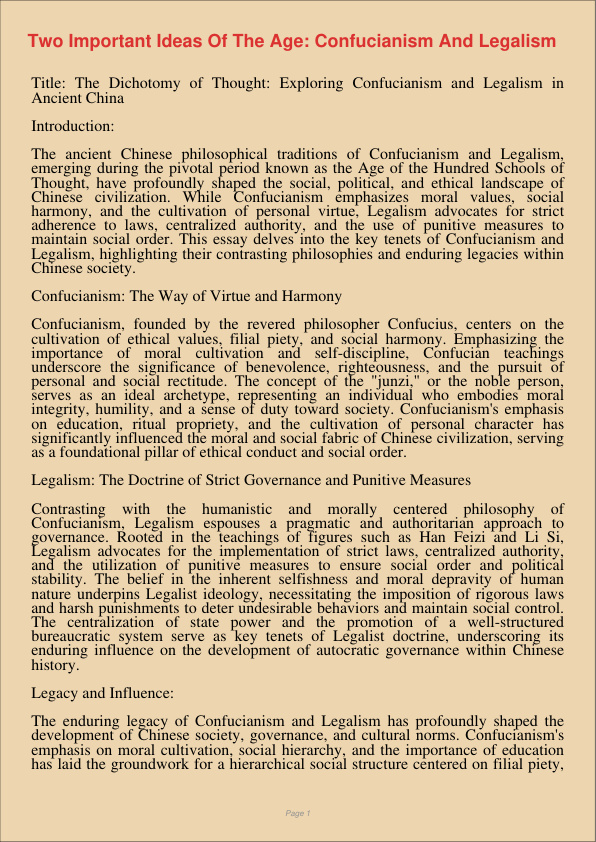Two Important Ideas Of The Age Confucianism And Legalism
Jan 9, 2024
two important ideas
legalism
Engineering and Construction
Law

Title: The Dichotomy of Thought: Exploring Confucianism and Legalism in Ancient China
Introduction:
The ancient Chinese philosophical traditions of Confucianism and Legalism, emerging during the pivotal period known as the Age of the Hundred Schools of Thought, have profoundly shaped the social, political, and ethical landscape of Chinese civilization. While Confucianism emphasizes moral values, social harmony, and the cultivation of personal virtue, Legalism advocates for strict adherence to laws, centralized authority, and the use of punitive measures to maintain social order. This essay delves into the key tenets of Confucianism and Legalism, highlighting their contrasting philosophies and enduring legacies within Chinese society.
Confucianism: The Way of Virtue and Harmony
Confucianism, founded by the revered philosopher Confucius, centers on the cultivation of ethical values, filial piety, and social harmony. Emphasizing the importance of moral cultivation and self-discipline, Confucian teachings underscore the significance of benevolence, righteousness, and the pursuit of personal and social rectitude. The concept of the “junzi,” or the noble person, serves as an ideal archetype, representing an individual who embodies moral integrity, humility, and a sense of duty toward society. Confucianism’s emphasis on education, ritual propriety, and the cultivation of personal character has significantly influenced the moral and social fabric of Chinese civilization, serving as a foundational pillar of ethical conduct and social order.
Legalism: The Doctrine of Strict Governance and Punitive Measures
Contrasting with the humanistic and morally centered philosophy of Confucianism, Legalism espouses a pragmatic and authoritarian approach to governance. Rooted in the teachings of figures such as Han Feizi and Li Si, Legalism advocates for the implementation of strict laws, centralized authority, and the utilization of punitive measures to ensure social order and political stability. The belief in the inherent selfishness and moral depravity of human nature underpins Legalist ideology, necessitating the imposition of rigorous laws and harsh punishments to deter undesirable behaviors and maintain social control. The centralization of state power and the promotion of a well-structured bureaucratic system serve as key tenets of Legalist doctrine, underscoring its enduring influence on the development of autocratic governance within Chinese history.
Legacy and Influence:
The enduring legacy of Confucianism and Legalism has profoundly shaped the development of Chinese society, governance, and cultural norms. Confucianism’s emphasis on moral cultivation, social hierarchy, and the importance of education has laid the groundwork for a hierarchical social structure centered on filial piety, respect for authority, and the pursuit of personal and communal excellence. On the other hand, Legalism’s impact is evident in the establishment of centralized bureaucratic systems, the codification of laws, and the reinforcement of state control, laying the foundation for the autocratic governance structures that have characterized various periods of Chinese history. The interplay between Confucian ethical values and Legalist notions of state control continues to influence contemporary Chinese thought and governance, reflecting the enduring significance of these ancient philosophical traditions.
Conclusion:
The philosophical traditions of Confucianism and Legalism, originating during the transformative Age of the Hundred Schools of Thought, represent contrasting approaches to ethics, governance, and social order. While Confucianism prioritizes moral cultivation, social harmony, and personal virtue, Legalism emphasizes strict governance, centralized authority, and punitive measures to maintain social control. Despite their differences, both philosophies have left an indelible mark on Chinese society, influencing the development of ethical norms, governance structures, and societal values. Understanding the complex interplay between Confucian and Legalist ideologies is essential in comprehending the historical and cultural evolution of ancient China, illuminating the enduring legacy of these philosophical traditions within contemporary Chinese thought and governance.